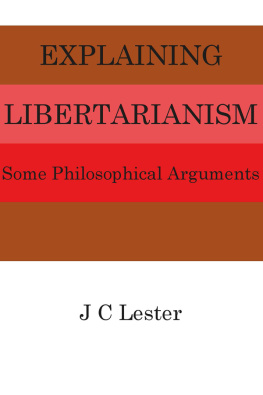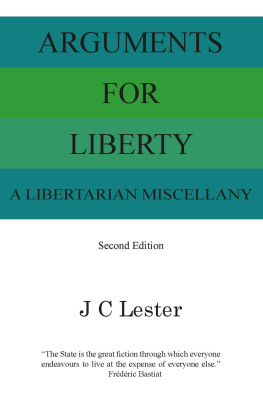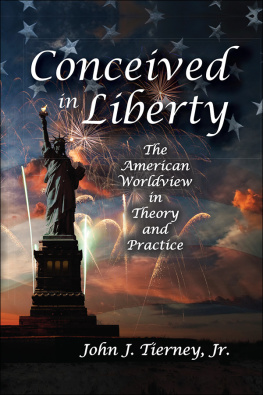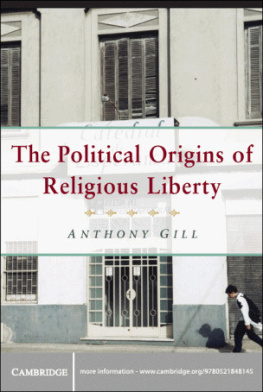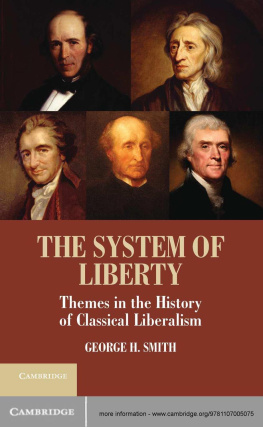First published in Great Britain in 2014 by
The University of Buckingham Press
Yeomanry House
Hunter Street
Buckingham MK18 1EG
J C Lester
The moral right of the author has been asserted.
All rights reserved. No part of this publication may be reproduced, stored or introduced into a retrieval system or transmitted in any form or by any means without the prior permission of the publisher nor may be circulated in any form of binding or cover other than the one in which it is published and without a similar condition including this condition being imposed on the subsequent purchaser.
A CIP catalogue record for this book is available at the British Library
ISBN 978-1-908684-50-9
To David McDonagh
philosopher and propagandist
Overview
This book seeks to answer many philosophical questions about liberty, including these crucial examples (for greater precision, some technical terms are unavoidable here that the book clarifies where they arise):
What is interpersonal (or social) liberty?
In vague and ambiguous terms: being free from aggression by others. As a precise, pre-propertarian, non-normative theory: the absence of interpersonal proactive (or initiated) imposed costs (preference-utility lowerings). For short: no proactive impositions.
What does liberty entail when there are clashes of proactive impositions?
Minimising those impositions, with compensation if necessary. If I light a fire to keep warm but its smoke adversely affects you, then both prohibiting and permitting the fire will proactively impose. So the most libertarian outcome is whatever minimises overall proactive impositions. Thus some intersubjective comparisons are unavoidable.
How does liberty relate to self-ownership and external property?
As a strong prima facie rule (i.e., rule libertarianism), it minimises proactive impositions for people to have exclusive resource-control (de facto ownership) over their bodies. As a similar rule, people require exclusive resource-control (de facto ownership) over any external things (including matter and memes) that thereby minimise proactive impositions. Thereafter, mutual voluntariness usually suffices for further libertarian conduct and property-acquisition. But problem cases (e.g., imprisoning someone by buying all the land around him) might require resort to the abstract theory. One can defend against or rectify infractions of liberty in any way that plausibly minimises proactive impositions.
How can we justify the truth of this theory of liberty and the desirability of its application?
We cant. All arguments and observations necessarily rest on assumptions. Therefore, epistemological justification (or any support) stronger than assumptions is logically impossible. (Mere agreement is often mistaken for justification.) There are ultimately only conjectures (i.e., assumptions) that one can criticise and test in a similarly conjectural way. However, one can explain and defend these conjectures (both are also often mistaken for justifications) within a conjectural framework. This is critical rationalism. It is the optimistic and logical use of reason instead of, dogmatic and illogical, justificationism, or relativism, or scepticism.
Should we prefer liberty for the consequences or because of rights?
Neither. The desirability of the consequences of liberty in systematic practice is a conjecture. The desirability of rights to liberty in systematic practice is a conjecture. Logically possible exceptions to either are irrelevant to the practical desirability of liberty. Neither consequences nor rights need be given precedence. In practice, consequences and rights tend to evolve together: we could not accept either rights with frequent terrible consequences or consequences that frequently flout rights. Moreover, at the theoretical extreme, rights and consequences collapse into each other: if certain consequences are overwhelmingly morally desirable then there is a prima facie right to them; if certain rights are overwhelmingly morally desirable then they must have good prima facie consequences. But liberty is not based on consequences, or rights, or both or anything else.
In what way should liberty be morally advocated?
Liberty should be advocated as a practical moral conjecture on its own. There need be no other moral principle. It is simply that there is no sound criticism of the conjecture that liberty is, in systematic practice, morally preferable. This preference can be explained and defended, but not justified or supported.
Is liberty compatible with the state?
No. The state is an unnecessary evil. Its inherent authoritarianism and extortion makes the state the foremost violator of liberty. The state is also an exacerbatory, or primary, or sole cause of all the genuine ills that it claims to cure. Consequent welfare losses compound hugely and very quickly. Libertarian anarchic order is the solution to illiberal political chaos.
Preface
It is an intellectually philistine view, often even held by libertarians, that philosophy is an irrelevance, or about undecidable matters, or merely arguing about words, or otherwise a waste of time. If we want to have a chance of practical change in the world, then what we should focus on we are told is propaganda. There is, it must be agreed, nothing wrong with the honest propagation of libertarianism. And there is often an immediate tension between philosophy and propaganda. Philosophy is more likely to criticise common sense and propaganda is more likely to court it. Hence it is sometimes not possible to engage in both at once. Nevertheless, philosophy is the best long-term propaganda: for philosophical confusions and problems do need to be sorted out if an ideology is to gain practical influence. In the meantime, however, a philosophical view is suspect if it is too popular: that indicates that it is not very philosophical. Thus it is philosophically auspicious to find theories that are at odds with almost all others on the subject. It is not that heterodox views are, ipso facto, more likely to be true. It is that they do, at least, stand a chance of making progress or, at worst, of challenging the orthodoxy in new and possibly illuminating ways.
Libertarian literature often displays a reasonably good grasp of the relevant economics, history, and sociology with respect to defending the interpersonal liberty of persons and their external property. But in the area of philosophy there is a considerable amount of unwitting confusion. This confusion is a significant impediment both as regards understanding libertarianism clearly and as regards dealing with criticism. It has three main aspects. First and foremost, there are muddled and moralised accounts of rights, self-ownership, and non-aggression (when what is needed is an explicit, non-moral, theory of the libertarian conception of liberty and how it relates to people and property). Second, there are versions of, necessarily erroneous, justificationist epistemology (when what is needed is seeing libertarianism as a bold conjecture to be criticised). Third, there is the use of particular and separate moral theories to defend libertarianism (when what is needed is advocating libertarianism itself as a moral conjecture). In the following essays these three key errors as well as numerous others are exposed in several libertarian texts and also a couple of texts critical of libertarianism. Consequently, there is a certain amount of repetition of these major points. But this is needed until the arguments are either understood and adopted or seriously criticised rather than dogmatically dismissed or ignored.

